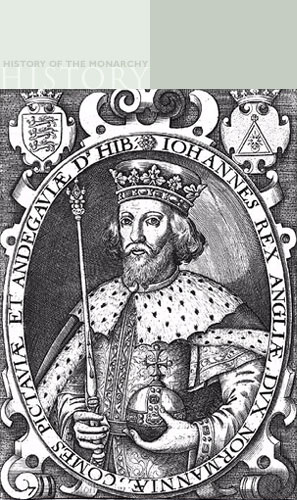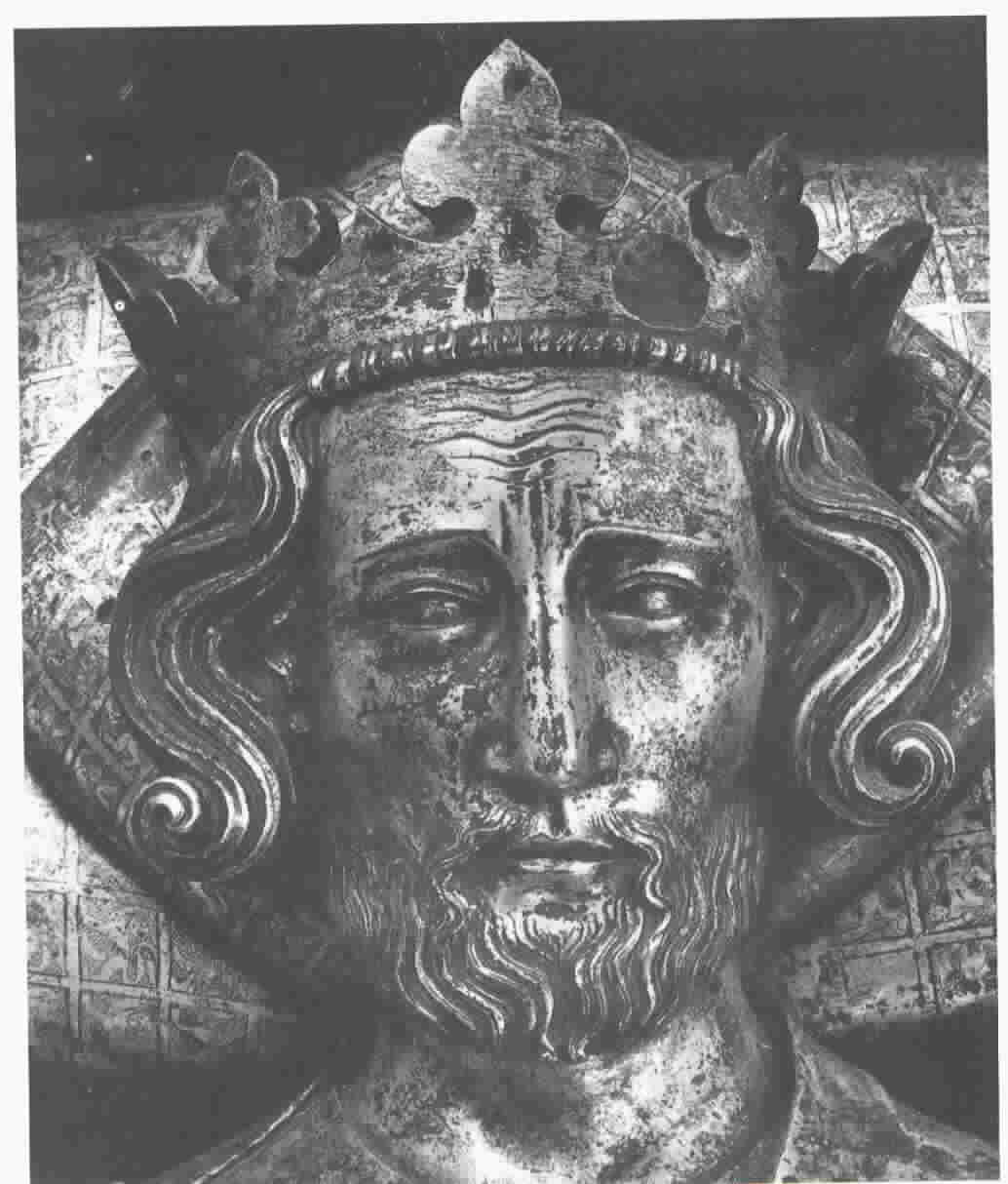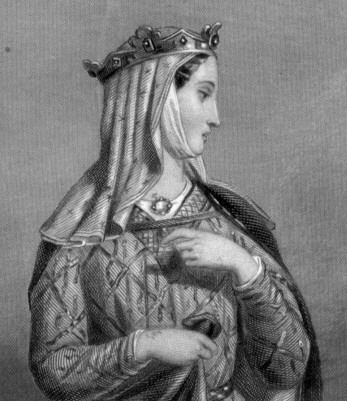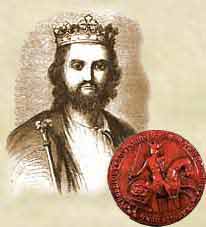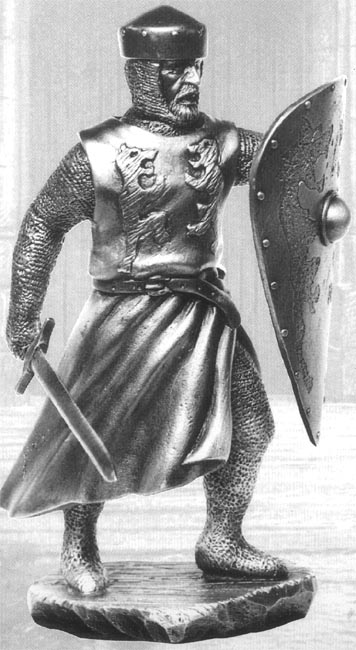of England Family - Ourfolk
King John Lackland of England 24 DEC 1167 - 19 OCT 1216
 |
King John was born on 24 DEC 1167 in Kings Manor House, Oxford, Oxfordshire, England and died on 19 OCT 1216 (age: 48) in Newark, Nottinghamshire, England . He was the son of King Henry Ii Plantagenet (5 MAR 1132 - 3 JUL 1189) and Queen Eleanor of Aquitaine (of France) (1123 - 31 MAR 1204). King John was married to Queen Isabella of Angoul me Taillefer (de Lusignan) on 26 AUG 1200 in Bordeaux, Gironde, France. Queen Isabella was born on 1188 in of, Beverley, Yorkshire, England and died on 31 MAR 1245 in Fontevrault, Fontevrault l'Ab, Maine-et-Loire, France . She was the daughter of William V Taillefer (ABT 1160 - 1218) and Alex de Courrtenay (Taillefer) (ABT 1160 - 1218). View Family Chart King John was married to Agatha de Ferrers (of England) . Agatha was born on ABT 1168 in Of, Chartley, Staffordshire, England . View Family Chart King John was married to Hawise Fitzwarin (of England) . Hawise was born on ABT 1167 . She is the daughter of Fulke Ii Fitzwarin (ABT 1145 - 1198) and Hawise de Dinan (Fitzwarin) (ABT 1147 - BEF 1167). View Family Chart - - -
| ||||||||||||||||||||||||||||||||||||||||||||||||||||||||||||||||||||||||||||||||||||||||||||||||||||||||||||||||||||||||||||||||||||||||||||||||||||||||||||||||||||||||||||||||||||||||||||||||||||||||||||||||||||||||||||||||||||||||||||||||||||||||||||||||||||||||||||||||||||||||||||||||||||||||||||||||||||||||||||||||||||||||||||||||||||||||||||||||||||||||||||||||||||||||||||||||||||||||||||||||||||||||||||||||||||||||||||||||||||||||||||||||||||||||||||||||||||||||||||||||||||||||||||||||||||||||||||||||||||||||||||||||||||||||||||||||||||||||||||||||||||||||||||||||||||||||||||||||||||||||||||||||||||||||||||||||||||||||||||||||||||||||||||||||||||||||||||||||||||||||||||||||||||||||||||||||||||||||||||||||||||||||||||||||||||||||||||||||||||||||||||||||||||||||||||||||||||||||||||||||||||||||
JOHN OF ENGLAND (1167-1216). Vicious, shameless, and ungrateful, King John has been called the worst king ever to rule England. Yet the very excesses of his reign proved positive in that they provoked such a violent reaction that his subjects revolted and forced him to put his seal on the Magna Carta. This document became the safeguard of English liberty. John's nickname was Lackland because at first he owned no land. Later his father, King Henry II, gave him castles, lands, and revenues in both England and France. John plotted against his father, however, and the discovery of this conspiracy was a factor in the king's death. John's brother, Richard the Lion-Hearted, became king and added to John's possessions. While Richard was absent from England on the Third Crusade, John conspired against him also.
When Richard died in 1199, the barons selected John to be their king. This denied the royal claim of Arthur, son of another brother, Geoffrey. Two French provinces fought for young Arthur, but the boy fell into the hands of John and died soon after. During the war John lost all his French possessions except Aquitaine. John then quarreled with Pope Innocent III about the appointment of Stephen Langton as archbishop of Canterbury. John was excommunicated, and England was forbidden all religious services except baptism and extreme unction. The growing discontent of his subjects finally forced John to recognize the new archbishop.
When John went to France seeking to regain his lands in Normandy, the barons marched against the king and demanded a charter of liberties. All but a handful of followers deserted John. He was forced to meet the barons at Runnymede on June 15, 1215, and to sign the Great Charter.
John had no intention of supporting the charter, however. He recruited a new army and destroyed the estates of the barons. The barons then offered the English crown to Louis, a French prince. In the midst of a war for the throne, John died of a fever. The task of restoring the torn kingdom fell to his nine-year-old son, Henry III.
John was on the list of those who had plotted against his father, Henry I, but was not successful in plotting against his brother, Richard. Richard gave him lands in Normandy and England, but these were not enough. While Richard was imprisoned, John unsuccessfully rebelled several times. Upon Richard's return, he was reprimanded and kept out of trouble for the last five years of his brother's reign and earned the succession to the throne.
John was respected as successor in England, but in Anjou, Maine, and Touraine Arthur, son of Geoffrey of Brittany, was recognized as sovereign. John persuaded Philip II to oust the twelve-year-old Arthur and became Lord of the Angevin Empire. He then annulled his marriage to Isabella of Gloucester, whom Richard had betrothed to him, and, in an effort to unite the two halves of his empire, married Isabella of Angouleme. Unfortunately, John's bride's former fiance appealed to Philip II, and Philip declared all of John's recent acquisitions forfeit.
John captured Arthur shortly after his possessions were forfeited. Arthur disappeared and the murder has never been proven.
Determined to get his territory back, John levied high taxes on his nobles. This also came at the time of a conflict with Pope Innocent III. John refused to accept the papal appointment to the position of Archbishop of Canterbury. The pope punished John by placing England and Wales under an interdict and excommunicating John a year later John, however, needed papal support to win his invasion of France. John made England a papal fief and invaded. In 1214, John lost the Battle of Bovines and the English barons had enough.
In 1215, the barons seized London and forced John to sign the Magna Carta at Runnymead. John had no intention of living up to the document, and the barons looked to Louis of France, Philip's son, for aid. Louis invaded England in 1216. John died that year in October with a nine-year old son as his successor.
John (reigned 1199-1216) was an able administrator interested in law and government but he neither trusted others nor was trusted by them. Heavy taxation, disputes with the Church (John was excommunicated by the Pope in 1209) and unsuccessful attempts to recover his French possessions made him unpopular. Many of his barons rebelled and in June 1215 they forced the King to sign a peace treaty accepting their reforms.
This treaty, later known as Magna Carta, limited royal powers, defined feudal obligations between the King and the barons, and guaranteed a number of rights. The most influential clauses concerned the freedom of the Church; the redress of grievances of owners and tenants of land; the need to consult the Great Council of the Realm so as to prevent unjust taxation; mercantile and trading relationships; regulation of the machinery of justice so that justice be denied to no one; and the requirement to control the behavior of royal officials.
The most important clauses established the basis of habeas corpus ('you have the body'), i.e. that no one shall be imprisoned except by due process of law, and that 'to no one will we sell, to no one will we refuse or delay right or justice'.
The Charter also established a council of barons who were to ensure that the Sovereign observed the Charter, with the right to wage war on him if he did not. Magna Carta was the first formal document insisting that the Sovereign was as much under the rule of law as his people, and that the rights of individuals were to be upheld even against the wishes of the sovereign. As a source of fundamental constitutional principles, Magna Carta came to be seen as an important definition of aspects of English law, and in later centuries as the basis of the liberties ofthe English people.
A peace treaty Magna Carta was a failure and the rebels invited Louis of France to become their king. When John died in 1216 England was in the grip of civil war.
When Richard died in 1199, the barons selected John to be their king. This denied the royal claim of Arthur, son of another brother, Geoffrey. Two French provinces fought for young Arthur, but the boy fell into the hands of John and died soon after. During the war John lost all his French possessions except Aquitaine. John then quarreled with Pope Innocent III about the appointment of Stephen Langton as archbishop of Canterbury. John was excommunicated, and England was forbidden all religious services except baptism and extreme unction. The growing discontent of his subjects finally forced John to recognize the new archbishop.
When John went to France seeking to regain his lands in Normandy, the barons marched against the king and demanded a charter of liberties. All but a handful of followers deserted John. He was forced to meet the barons at Runnymede on June 15, 1215, and to sign the Great Charter.
John had no intention of supporting the charter, however. He recruited a new army and destroyed the estates of the barons. The barons then offered the English crown to Louis, a French prince. In the midst of a war for the throne, John died of a fever. The task of restoring the torn kingdom fell to his nine-year-old son, Henry III.
John was on the list of those who had plotted against his father, Henry I, but was not successful in plotting against his brother, Richard. Richard gave him lands in Normandy and England, but these were not enough. While Richard was imprisoned, John unsuccessfully rebelled several times. Upon Richard's return, he was reprimanded and kept out of trouble for the last five years of his brother's reign and earned the succession to the throne.
John was respected as successor in England, but in Anjou, Maine, and Touraine Arthur, son of Geoffrey of Brittany, was recognized as sovereign. John persuaded Philip II to oust the twelve-year-old Arthur and became Lord of the Angevin Empire. He then annulled his marriage to Isabella of Gloucester, whom Richard had betrothed to him, and, in an effort to unite the two halves of his empire, married Isabella of Angouleme. Unfortunately, John's bride's former fiance appealed to Philip II, and Philip declared all of John's recent acquisitions forfeit.
John captured Arthur shortly after his possessions were forfeited. Arthur disappeared and the murder has never been proven.
Determined to get his territory back, John levied high taxes on his nobles. This also came at the time of a conflict with Pope Innocent III. John refused to accept the papal appointment to the position of Archbishop of Canterbury. The pope punished John by placing England and Wales under an interdict and excommunicating John a year later John, however, needed papal support to win his invasion of France. John made England a papal fief and invaded. In 1214, John lost the Battle of Bovines and the English barons had enough.
In 1215, the barons seized London and forced John to sign the Magna Carta at Runnymead. John had no intention of living up to the document, and the barons looked to Louis of France, Philip's son, for aid. Louis invaded England in 1216. John died that year in October with a nine-year old son as his successor.
John (reigned 1199-1216) was an able administrator interested in law and government but he neither trusted others nor was trusted by them. Heavy taxation, disputes with the Church (John was excommunicated by the Pope in 1209) and unsuccessful attempts to recover his French possessions made him unpopular. Many of his barons rebelled and in June 1215 they forced the King to sign a peace treaty accepting their reforms.
This treaty, later known as Magna Carta, limited royal powers, defined feudal obligations between the King and the barons, and guaranteed a number of rights. The most influential clauses concerned the freedom of the Church; the redress of grievances of owners and tenants of land; the need to consult the Great Council of the Realm so as to prevent unjust taxation; mercantile and trading relationships; regulation of the machinery of justice so that justice be denied to no one; and the requirement to control the behavior of royal officials.
The most important clauses established the basis of habeas corpus ('you have the body'), i.e. that no one shall be imprisoned except by due process of law, and that 'to no one will we sell, to no one will we refuse or delay right or justice'.
The Charter also established a council of barons who were to ensure that the Sovereign observed the Charter, with the right to wage war on him if he did not. Magna Carta was the first formal document insisting that the Sovereign was as much under the rule of law as his people, and that the rights of individuals were to be upheld even against the wishes of the sovereign. As a source of fundamental constitutional principles, Magna Carta came to be seen as an important definition of aspects of English law, and in later centuries as the basis of the liberties ofthe English people.
A peace treaty Magna Carta was a failure and the rebels invited Louis of France to become their king. When John died in 1216 England was in the grip of civil war.
- Queen of England
Last change (on this page): 15 OCT 2018
